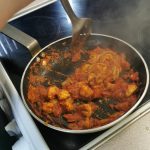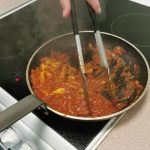Knowledge Based Curriculum Map
This term in Food technology KS4 have been revising for upcoming GCSE exam, the pupils have focused on key vocabulary and completed a range of written exam questions from previous papers.
During practical lessons pupils have made dishes from countries all over the world which include Italy, India, USA, Spain and Mexico.
After cooking the dish pupils then evaluate how/what they can change next time to change flavours, taste and smell.
Ks3 have also been working towards completing AQA awards in theory lessons, the pupils have learnt lots of new vocabulary which will help them progress during KS4.
Chef of the term was awarded to Ellis Parr from class 3 and also Isaac Radcliffe from class 6.
Our GCSE Food Preparation and Nutrition specification sets out the knowledge, understanding and skills required to cook and apply the principles of food science, nutrition and healthy eating.
The majority of the specification should be delivered through preparation and making activities. Students must be able to make the connections between theory and practice to apply their understanding of food and nutrition to practical preparation.
Topics and themes have been grouped to help you teach the specification, but these are not intended as a route through the specification, you can teach the content in any order. The topics are:
- Food, nutrition and health
- Food science
- Food safety
- Food choice
- Food provenance.
The range of food and ingredients studied should reflect the recommended guidelines for a healthy diet based on the main food commodity groups. Food groups include:
- bread, cereals, flour, oats, rice, potatoes and pasta
- fruit and vegetables (fresh, frozen, dried, canned and juiced)
- milk, cheese and yoghurt
- meat, fish, eggs, soya, tofu, beans, nuts and seeds
- butter, oil, margarine, sugar and syrup.
Aims and learning outcomes
Courses based on this specification should enable students to:
- demonstrate effective and safe cooking skills by planning, preparing and cooking using a variety of food commodities, cooking techniques and equipment
- develop knowledge and understanding of the functional properties and chemical processes as well as the nutritional content of food and drinks
- understand the relationship between diet, nutrition and health, including the physiological and psychological effects of poor diet and health
- understand the economic, environmental, ethical, and socio-cultural influences on food availability, production processes, and diet and health choices
- demonstrate knowledge and understanding of functional and nutritional properties, sensory qualities and microbiological food safety considerations when preparing, processing, storing, cooking and serving food
- understand and explore a range of ingredients and processes from different culinary traditions (traditional British and international), to inspire new ideas or modify existing recipes.





